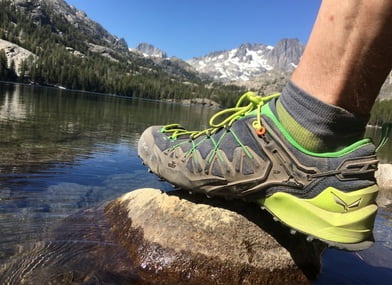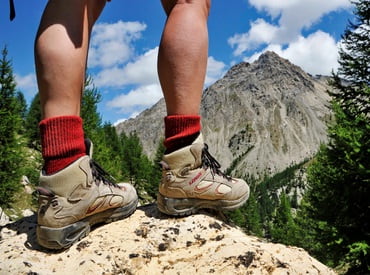
Hiking boots or hiking shoes?
Are you a new hiker and not too experienced with different types of hiking footwear? Don’t be confused! We are here to guide you through a detailed comparison of hiking boots vs hiking shoes so that you can decide which one is best for you! Let’s scroll down for more.
Contents
Hiking Boots Vs Hiking Shoes: Detailed Comparison
It can be difficult to choose between hiking boots and shoes for those who are new to hiking. Remember that the wrong footwear can cause debilitating pain, black toenails, and sore toe blisters, whereas the right footwear allows you to travel thousands of miles without difficulty.
To determine which is better between these two, we will provide you with four key factors for your consideration.
Weight
When choosing your footwear, consider how much comfort you will need for the length of time that you’ll be outdoors – or a thru-hike or a day hike can require very different gear! In this aspect, boots are the heaviest choice among hiking footwear (including shoes), so you’ll likely exert more energy with each step.
Material
Let’s imagine hiking boots from years ago – think of large, bulky combinations of rubber and leather. That’s what our beloved grandparents and parents wore out for their day hikes into the “Great Outdoors.”
Designed with rugged metal hardware, these boots target to keep one’s feet safe and comfortable at all costs. Sometimes, it even takes us quite a long time to lace them up.
Hiking shoes are a different story! The lower tops and mesh components make them more flexible and elastic. They won’t withstand the same rigours (like debris and damage) as hiking boots, though.

Breathable hiking shoes
Durability
Regarding the longevity of each footwear, you also have to pay attention to its midsole’s durability. If hiking with a heavy backpack, it will wear down your shoes over time. In such cases, the boots are so far the better option as they can handle the extra weight.
You can expect a good pair of hiking boots to last you 1,500 kilometres or so. The lightweight shoes, on the other hand, will not give you the same amount. On average, you need to replace hiking shoes every 500 miles in order to prevent excessive wear and foot problems.
Features
- Stability
If you are looking for something that provides stability, then hiking boots might be a better choice than shoes.
With rubber soles and thick lugs, good-quality trekking boots offer excellent traction on rocky surfaces while biting well into most types of soil. These characteristics help prevent slipping during your journey.
As for hiking shoes with their lightweight features and soft EVA midsoles, they would never bring you a stable feeling as regular boots.

Hiking boots with higher tops
- Waterproof
Even the highest quality waterproof boots only provide short-term protection from the rain. Just imagine the weight of what you wear when water runs down your pant legs and into your footwear. What is worse than those wet, heavy boots?
Surely the wet hiking shoes will perform better in this regard. Not to mention that the boots will take forever to completely dry out unless you use a hairdryer or radiator.
- Ankle Support
What makes hiking boots stand out most is the high ankles that can support and reduce the risk of spraying or rolling your ankles. They will deliver more comfort and ankle support than hiking shoes – which don’t cover one’s ankles at all.
Hiking Shoes Vs Hiking Boots: Pros And Cons
Hiking boots
Pros
- Suitable when hiking in extremely wet and cold conditions
- Protect the full foot from rock, items underfoot (nails, glass, etc.), pests, parasites, and poisonous plant
- Long-lasting and durable
- Better comfort and ankle support
- Superior when carrying heavy loads
Cons
- Less breathable material – susceptible to blisters and sweat buildup
- High price
- Heavy and tiring during long distances
Hiking shoes
Pros
- Breathable material
- More versatile
- Lightweight and less tiring to walk in
- Foot protection and good solid soles
Cons
- Lack ankle support
- Less durable
Hiking Shoes Vs Hiking Boots: Which One Is Better?
Hiking shoes are particularly good choices for gentle terrain and dry weather. Even when it rains, they’re also better than heavy hiking boots because breathable material and lightweight features make them dry more quickly than leather.
When it comes to hiking boots, “tough terrains” springs to our minds right away. Regular boots are stable and protective with a mixture of rubber, metal, and leather components. If you’re new to hiking or need additional ankle support, go for hiking boots with higher tops and tougher uppers!
Conclusion
Now that we’ve covered everything about these two types of footwear. Hiking boots vs hiking shoes – the decision is yours! Just keep in mind that before every hike, it’s important to know what type of terrain and weather you will be encountering. That way, you will prevent some unwanted incidents with your footwear.
Enjoy your hikes!





